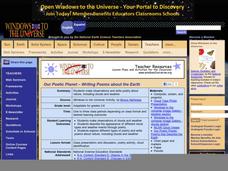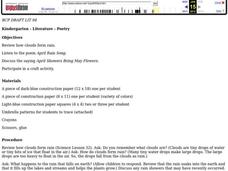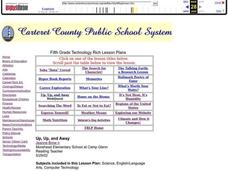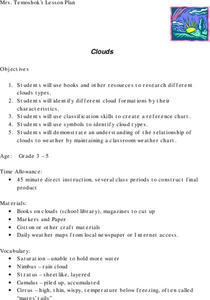Curated OER
Clouds
Incorporate art and poetry into an early elementary science lesson plan about cloud formation. With fun and engaging activities that follow a natural learning progression, youngsters will develop key vocabulary and conceptual...
Curated OER
Our Poetic Planet - Writing Poems about the Earth
As a way to combine language arts and science, try this activity on writing cloud poetry. Begin by showing a PowerPoint presentation and images of cloud types. Take meteorology masters outdoors to explore the sky using the provided...
Curated OER
Cloud Poems
First graders make daily observations about clouds, write in their cloud books, make cloud charts, and make a poem about clouds.
Curated OER
Whale Song Acrostic
What do whales sing about? Invite your class to imagine the thoughts of whales before writing acrostic poems on the topic. The plan blends together a bit of life science with plenty of opportunities for creativity and writing.
Curated OER
Clouds and What They Mean
An excellent resource on cloud types and descriptions could be a valuable addition to your science lesson. After kids learn the correct vocabulary to describe clouds, they complete several worksheets and thermometer activities before...
Sunburst Visual Media
Clouds
Support science instruction with a combination of engaging activities and skills-based worksheets that focus on clouds. Learners take part in grand discussions, write an acrostic poem, complete graphic organizers, solve word puzzles, and...
Curated OER
Poetry in Weather
Students identify clouds outdoors using a cloud chart and then draw the types they observe. They read the poem, "Fog" by Carl Sandburg and then compose their own cloud poem using various styles of poetry.
Curated OER
Plasma Clouds in Space and Density
Use this plasma clouds worksheet to have learners find the density of 10 different plasma clouds using a given formula which uses the reflection frequency to determine the density.
Curated OER
Splish, Splash Poetry
Students write weather shape poems and sing weather related songs. In this creative writing lesson, students read the book, It's Raining, It's Pouring and list weather words they heard in the story. Students use the writing process to...
Discover Earth
Weather Stations
Transform your classroom into a fully functioning weather station with this series of hands-on investigations. Covering the topics of temperature, precipitation, wind patterns, and cloud formation, these activities engage young...
Curated OER
Understanding Cloud Formation
Learners view a demonstration that simulates cloud formation. They read a poem about clouds, participate in a class demonstration using warm water and ice and write a paragraph summarizing their observations.
Curated OER
Identifying Clouds
Students work in groups to research and prepare a report on cloud types. They present their findings to the class and take a group quiz competing for points. Students go outside and determine which type of clouds are visible on that day.
Curated OER
Weathering the Weather
A fine weather poem sets the tone for this short lesson on the natural phenomena that affects weather. Weather topics covered are, air moisture, temperature, pressure, direction/speed, and clouds.
Curated OER
Poetry
Students review how clouds form rain, listen to the poem April Rain Song, discuss the saying April Showers Bring May Flowers, and participate in a craft activity.
Curated OER
Our Poetic Planet : Writing Poems about the Earth
Students share their thoughts regarding nature. In this poetry lesson, students compose poems in different formats that feature weather and clouds.
Curated OER
Poetry in Weather
Young scholars observe and identify the various types of clouds. They compare clouds to clouds on a chart, and in small groups compose and present a group poem about clouds and weather.
Curated OER
Poetry in Weather
Students identify various types of clouds and write poetry about the weather.
Curated OER
What is a Cloud
Third graders study clouds and how they are formed. They write acrostic poems about clouds and analyze and graph temperature data collected during varying degrees of cloud cover.
Curated OER
Understanding Cloud Formation
Students explore air and clouds by watching demonstration. They perform an experiment to measure air pressure changes.
Curated OER
Up, Up, and Away
Fifth graders participate in a WebQuest that introduces them to a study on clouds and how they relate to weather systems.
Curated OER
Clouds
Students explore the characteristics of clouds, their formation, symbols used in their identification, and the relationship of clouds to weather. The lesson focuses on how they are formed and their classification.
Curated OER
Weather Poems
In this weather worksheet, learners unscramble poems about weather patterns which were used before modern technology aided meteorologists. They use the pictures as clues.
Curated OER
What is a Cloud?
Third graders identify a cloud and explore how they form. They create an acrostic poem about clouds.
NASA
Water Works on a Blue Planet
Keep within a water budget. Learners find out that less than 2.5% of Earth's water is available to drink—and that there is a fixed amount of water. Scholars read an interesting article comparing the available water to a game of Monopoly...

























